江苏大学 江大 2009年二外日语 考研真题及答案解析
2009年12月日语能力考二级真题读解部分03

2009年12月日语能力考二级真题读解部分032009年12月日语能力考二级真题读解部分。
考生们在日语备考中都会看大量资料,做大量习题来提高日语水平,可是在能力考前还是不能确定自己的掌握情况,那就让往年二级真题来帮你检测一下吧!問題Ⅲ次の(1)から(4)の文章を読んで、それぞれの問いに対する答えとして最も適当なものを1.2.3.4から一つ選びなさい。
(1)現代に生きる私たちが美術館へ行くことの社会的な意味は、自分とはちがった人が(注1)この世のなかにはたくさんいて、彼らは自分とはちがった世界を見ている...ということを知ることにある。
世界は(注2)均質でも(注3)均一でもない。
世の中には人の数だけちがった価値観が存在し、一枚の絵を見ても、だれ一人として、まったく同じことを感じたりはしないはずなのだ。
(注1)この世:この世界(注2)均質:同じ性質を持っていること(注3)均一:すべてが等しいこと問(1)筆者の考えと合っているものはどれか。
1.人は全く同じことを感じることはないか、美術館へ行けば同じ絵を好む人と出会える。
2.人はそれぞれに価値観が異なるため、人それぞれに絵を見て感じるものが異なる。
3.人は美術館へ行くことで、普段自分が生きている世界とは違った世界が見られる。
4.人は異なる価値観を持つため、違った世界がみたくなったとき美術館に集まる。
(2)(次の文章は、自然の中に生きるサルについて述べたものである。
)サルにエサを与える人は、(注1)野生動物をペットと勘違いし、食べ物をやることによってたのしい気分になったり、いいことをしたような気持ちになったりする。
人とサルは(注2)接触することなく暮らすのが自然な姿だ。
(中略)エサをやる人が、サルに「どうしたの?」とはなしかけたり、連れの人を横に立たせて楽しそうに写真を撮ったりする。
それはペットと勘違いしている(注3)証拠だ。
(注1)野生動物:人間に飼われていない自然のままの動物(注2)接触する:ここでは、近づいたりさわったりする(注3)証拠:あることが正しいことを明らかにするもの、証明するもの問(1)筆者の意見として、最も適当なものはどれか。
2009年12月日本语能力试験2级真题

2009年12月日本語能力試験2級文字語彙(100点35分)問題Ⅰ次の下線をつけたことばは、どのように読になすか。
その読に方をそれぞれの1.2.3.4から一つ選びなさい。
問1・あの塀は(1)傾いているので近づかないほうがいいですよ。
(2)危険です。
(1).傾いて1.たたいて2.きずついて3.きずいて4.かたむいて(2).危険1.きげん2.きけん3.きんけん4.きっけん問2・先日(3)宿泊したホテルは、(4)設備が良く(5)快適だった。
(3).宿泊1.しゅくはく2.しゅっぱく3.しょっぱく4.しょくはく(4).設備1.よび2.せいび3.じゅんび4.せつび(5).快適1.けつてき2.かいでき3.かいてき4.けつてき問3・この本を読むと、(6)政治(7)全般についての(8)知識が(9)得られる。
(6).政治1.せっじ2.せいじ3.せっち4.せいち(7).全般1.ぜんはい2.ぜんぱん3.ぜいはん4.ぜんぱい(8).知識1.ちじ2.ちせい3.ちしき4.ちえ(9).得られる1.えられる2.かたられる3.のべられる4.とられる問4・昨日は(10)担当者がいなかったため、(11)改めて明日訪ねることにした。
(10).担当者1.たんとうしゃ2.だんとうしゃ3.だんどうしゃ4.たんどうしゃ(11).改めて1.なぐさめて2.あきらめて3.あらためて4.たしかめて問5・あの男は、金を(12)盗んだ(13)疑いで調べられているそうだ。
(12).盗んだ1.はさんだ2.つかんだ3.たたんだ4.ぬすんだ(13).疑い1.うたがい2.たたかい3.うかがい4.あつかい問6・田中さんは(14)情報を(15)処理する能力に(16)優れている。
(14).情報1.じょうぼう2.じょうほう3.じょぼう4.じょほう(15).処理1.しょり2.しゅり3.しゅうり4.しょうり(16).優れて1.あこがれて2.すぐれて3.あふれて4.あぐまれて問7・(17)突然、火山が噴火し、(18)溶岩が流れ出した。
2009级二外A
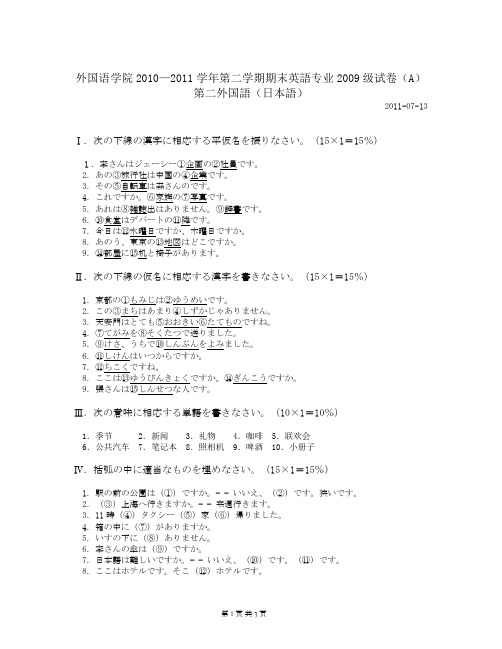
外国语学院2010—2011学年第二学期期末英語专业2009级试卷(A)第二外国語(日本語)2011-07-13 Ⅰ.次の下線の漢字に相応する平仮名を振りなさい。
(15×1=15%)1.李さんはジェーシー①企画の②社員です。
2.あの③旅行社は中国の④企業です。
3.その⑤自転車は森さんのです。
4.これですか。
⑥家族の⑦写真です。
5.あれは⑧雑誌出はありません。
⑨辞書です。
6.⑩食堂はデパートの⑪隣です。
7.今日は⑫水曜日ですか、木曜日ですか。
8.あのう、東京の⑬地図はどこですか。
9.⑭部屋に⑮机と椅子があります。
Ⅱ.次の下線の仮名に相応する漢字を書きなさい。
(15×1=15%)1.京都の①もみじは②ゆうめいです。
2.この③まちはあまり④しずかじゃありません。
3.天安門はとても⑤おおきい⑥たてものですね。
4.⑦てがみを⑧そくたつで送りました。
5.⑨けさ、うちで⑩しんぶんをよみました。
6.⑪しけんはいつからですか。
7.⑫ちこくですね。
8.ここは⑬ゆうびんきょくですか。
⑭ぎんこうですか。
9.張さんは⑮しんせつな人です。
Ⅲ.次の意味に相応する単語を書きなさい。
(10×1=10%)1.季节 2.新闻 3.礼物 4.咖啡5.联欢会6.公共汽车7.笔记本8.照相机9.啤酒10.小册子Ⅳ.括弧の中に適当なものを埋めなさい。
(15×1=15%)1.駅の前の公園は(①)ですか。
——いいえ、(②)です。
狭いです。
2.(③)上海へ行きますか。
——来週行きます。
3.11時(④)タクシー(⑤)家(⑥)帰りました。
4.箱の中に(⑦)がありますか。
5.いすの下に(⑧)ありません。
6.李さんの傘は(⑨)ですか。
7.日本語は難しいですか。
——いいえ、(⑩)です。
(⑪)です。
8.ここはホテルです。
そこ(⑫)ホテルです。
9.李さん、だれ(⑬)その花(⑭)もらいましたか。
10.万里の長城は北京(⑮)遠いですか。
2009 年在职攻读硕士学位全国联考日语真题+答案

さんから毎日のように病院に電話があったそうです。トラックの運転手をしていた彼は、
仕事で全国を走り回っていたため、直接に病院に見舞いに来られなかったのです。入院し
て以来、田中さんは何度か危険な状態になったことがあったそうです。48そのたびに、看
D.ご親切にありがとうございました
4.「申し訳ございませんが、もう少しゆっくり話してくださいませんか。」
「。」
A.はい、もっと速めに話します
B.はい、ゆっくり話していますよ
C.すみません。ぜんぜん聞いて分かりません
D.ごめんなさい。つい早口になっちゃって
5.「よかったら、今晩家にご飯を食べに来ないか。」
なにしろ、千人以上もの生徒のこと、52なかなか徹底しない。何回か注意したり、立て
札を立てたりしたが、一向にやめないので、雨漏りの苦情が絶えなかった。
腹が立って仕方がなくて、有刺鉄線を張り、上がれないようにしてしまった。
ところが、しばらく経つと、禁札だけは残して、鉄線が何者かに切り取られてしまった。
調べると、その理由は、生徒たちが、その上に上がるのに不便だからというのではなく、
ころで、突然「リーンリーン」という電話のベルが鳴り、一瞬て、鳴り響くそのベルの音を聞きながら、看護婦さんたちがボ
ロボロ涙を流していた光景を、10年近く経った今でも鮮明に思い出すことができるのです。
注持ち直す∕好转ナース・ステーション∕护士值班室
質問:
A.くださいませB.申し上げます
C.なさいますD.頂きます
四、読解
次の文章を読んで後の質問に答えなさい。(1.5点×20=30点)
2009年12月日语能力考二级真题文法部分01
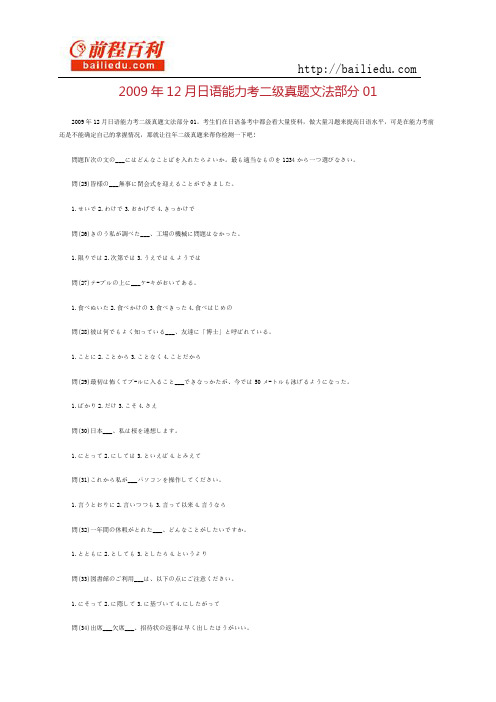
2009年12月日语能力考二级真题文法部分012009年12月日语能力考二级真题文法部分01。
考生们在日语备考中都会看大量资料,做大量习题来提高日语水平,可是在能力考前还是不能确定自己的掌握情况,那就让往年二级真题来帮你检测一下吧!問題Ⅳ次の文の___にはどんなことばを入れたらよいか。
最も適当なものを1234から一つ選びなさい。
問(25)皆様の___無事に閉会式を迎えることができました。
1.せいで2.わけで3.おかげで4.きっかけで問(26)きのう私が調べた___、工場の機械に問題はなかった。
1.限りでは2.次第では3.うえでは4.ようでは問(27)テ-ブルの上に___ケ-キがおいてある。
1.食べぬいた2.食べかけの3.食べきった4.食べはじめの問(28)彼は何でもよく知っている___、友達に「博士」と呼ばれている。
1.ことに2.ことから3.ことなく4.ことだから問(29)最初は怖くてプ-ルに入ること___できなっかたが、今では50メ-トルも泳げるようになった。
1.ばかり2.だけ3.こそ4.さえ問(30)日本___、私は桜を連想します。
1.にとって2.にしては3.といえば4.とみえて問(31)これから私が___パソコンを操作してください。
1.言うとおりに2.言いつつも3.言って以来4.言うなら問(32)一年間の休暇がとれた___、どんなことがしたいですか。
1.とともに2.としても3.としたら4.というより問(33)図書館のご利用___は、以下の点にご注意ください。
1.にそって2.に際して3.に基づいて4.にしたがって問(34)出席___欠席___、招待状の返事は早く出したほうがいい。
1.しては/しては2.したり/したり3.するやら/するやら4.するにしろ/するにしろ問(35)その島は、森林の減小___、鳥や動物の数が減ってきている。
1.にともなって2.をたよりに3.をめぐり4.に対し問(36)しばらく連絡がない___、そんなに心配することないよ。
2009年4月第二外语(日语)试卷
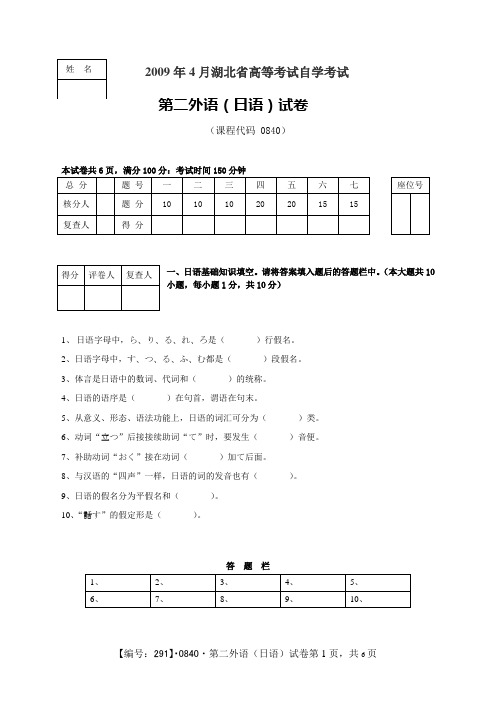
2009年4月湖北省高等考试自学考试第二外语(日语)试卷(课程代码 0840)本试卷共6页,满分100分:考试时间150分钟一、日语基础知识填空。
请将答案填入题后的答题栏中。
(本大题共10小题,每小题1分,共10分)1、 日语字母中,ら、り、る、れ、ろ是( )行假名。
2、日语字母中,す、つ、る、ふ、む都是()段假名。
3、体言是日语中的数词、代词和( )的统称。
4、日语的语序是()在句首,谓语在句末。
5、从意义、形态、语法功能上,日语的词汇可分为( )类。
6、动词“立つ”后接接续助词“て”时,要发生( )音便。
7、补助动词“おく”接在动词( )加て后面。
8、与汉语的“四声”一样,日语的词的发音也有( )。
9、日语的假名分为平假名和( )。
10、“話す”的假定形是( )。
答 题 栏10分。
)11、王さんは顔を洗っています。
12、李さんは名前を書いています。
13、このりんごはとても新鮮です。
子供の世話をするのが大変です。
14、張さんからお土産をもらいます。
15、16、あれは王さんの雑誌です。
17、会議は午後2時からです。
18、雪の日に歩いて会社へ行くことがあります。
19、そんなに急がなくてもいいです。
20、若いころ、よくお酒を飲んだものだよ。
答题栏答案的字母填入题后答题栏中。
(本大题共10小题,每小题1分,共10分。
)212223、部屋にはでんわはありません。
24、テニスはそんなにきらいではありません。
25262728、必ずしょくじのあとで薬を飲んでください。
29、雨がふるので、遠足が中止しました。
30答 题 栏语法选择题四、从A 、B 、C 、D 中选出一个正确答案,并将所选答案的字母填入题后答题栏中。
(本大题共10小题,每小题2分,共20分。
)31、午前 私は新宿へ行きました。
32、昨日ここにだれ来ました。
33、机の上に本ノートがあります。
34、母台所にいます。
35、書店の前王さんと会いました。
2009年12月日语能力考二级真题读解部分01

2009年12月日语能力考二级真题读解部分012009年12月日语能力考二级真题读解部分。
考生们在日语备考中都会看大量资料,做大量习题来提高日语水平,可是在能力考前还是不能确定自己的掌握情况,那就让往年二级真题来帮你检测一下吧!問題Ⅰ次の文章を読んで、後の問いに答えなさい。
答えは、1234から最も適当なものを一つ選からびなさい。
最近、人間の認知、つまり、「人がどのようにものを見、どのようにものを感じるか」についての研究が進んでいて、それについて勉強する機会が増えました。
①そこで知ったことなのですが、人間は、起こっているすべてのことを見たり、感じたりするのではなく、そのほんの一部の情報のみを処理するということです。
ちょっと言葉がむずかしくなりましたが、②時計を見ている人には時計のことはよくわかっていても、同じ部屋の、たとえばテレビの番組には目もやっていなければ、音がしていてもほとんど何を聴いているのかを無視してしまうのです。
③記憶についても同じことが言えて、やはり自分の中で気になっていることはよく覚えているし、よく思い出すのですが、そうでないことはほとんど覚えていないかったり、覚えていたとしても思い出すことがほとんどないのです。
(④)、こういうことが起こります。
たとえば、自分が気に入っている人や好きな人については、いい面ばかりが見えるし、やってもらったいいことばかりを思い出すのに、嫌いな人については悪い面ばかりが見えたり感じられたりする。
⑤その人がしたことについては、悪いことばかりを思い出すのです。
たとえば、⑥意地悪な(注1)上司がいたとしても、意地悪だけをしていたら、仕事にはなりません。
たぶん、(注2)通常業務の命令や指導もしているはずなのに、そのことはまったく目に入らなかったり、記憶に残らないのに、その人のきついことばや、その人にされたことだけを思い出すのです。
つまり、自分のことを不運だ、不幸だと思っている人は、今いる世界の中で、不運なことや嫌なことばかりが目についたり、感じられたりするし、記憶の中の不運なこと*不運なことばかりが思い出されるのに、幸運だ、幸せだ体験の中からでも、幸せなこと、幸運なことを感じ取るし、記憶の中と思っている人は、同じような(注3)でもいいことを思い出すということなのです。
2009年12月日语能力考一级真题读解部分02
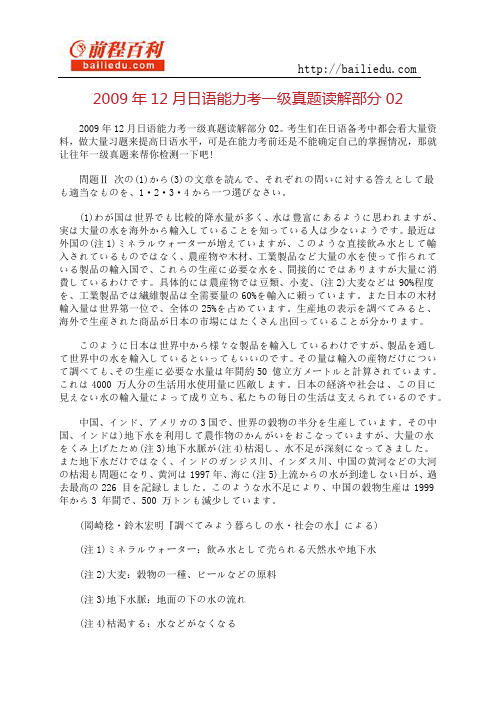
2009年12月日语能力考一级真题读解部分02。
考生们在日语备考中都会看大量资料,做大量习题来提高日语水平,可是在能力考前还是不能确定自己的掌握情况,那就让往年一级真题来帮你检测一下吧!問題Ⅱ 次の(1)から(3)の文章を読んで、それぞれの問いに対する答えとして最も適当なものを、1·2·3·4から一つ選びなさい。
(1)わが国は世界でも比較的降水量が多く、水は豊富にあるように思われますが、実は大量の水を海外から輸入していることを知っている人は少ないようです。
最近は外国の(注1)ミネラルウォーターが増えていますが、このような直接飲み水として輸入されているものではなく、農産物や木材、工業製品など大量の水を使って作られている製品の輸入国で、これらの生産に必要な水を、間接的にではありますが大量に消費しているわけです。
具体的には農産物では豆類、小麦、(注2)大麦などは90%程度を、工業製品では繊維製品は全需要量の60%を輸入に頼っています。
また日本の木材輸入量は世界第一位で、全体の25%を占めています。
生産地の表示を調べてみると、海外で生産された商品が日本の市場にはたくさん出回っていることが分かります。
このように日本は世界中から様々な製品を輸入しているわけですが、製品を通して世界中の水を輸入しているといってもいいのです。
その量は輸入の産物だけについて調べても、その生産に必要な水量は年間約50 億立方メートルと計算されています。
これは4000 万人分の生活用水使用量に匹敵します。
日本の経済や社会は、この目に見えない水の輸入量によって成り立ち、私たちの毎日の生活は支えられているのです。
中国、インド、アメリカの3国で、世界の穀物の半分を生産しています。
その中国、インドは)地下水を利用して農作物のかんがいをおこなっていますが、大量の水をくみ上げたため(注3)地下水脈が(注4)枯渇し、水不足が深刻になってきました。
2009年真题及标准答案

2009年考研英语真题2009年全国硕士研究生入学统一考试英语试题Section I Use of EnglishDirections:Read the following text. Choose the best word(s) for each numbered blank and mark A, B, C or D on ANSWER SHEET 1. (10 points)Research on animal intelligence always makes us wonder just how smart humans are. _1_ the fruit-fly experiments described in Carl Zimmer in the Science Times. Fruit flies who were taught to be smarter than the average fruit fly __2 to live shorter lives. This suggests that 3 bulbs burn longer, that there is a(n) __4 in not being too bright.Intelligence, it __5 , is a high-priced option. It takes more upkeep, burns more fuel and is slow __6 _ the starting line because it depends on learning —a(n)__7 _ process —instead of instinct. Plenty of oth er species are able to learn, and one of the things they‘ve apparently learned is when to __8 .Is there an adaptive value to __9 _ intelligence? That‘s the question behind this new research. Instead of casting a wistful glance __10 at all the species w e‘ve left in the dust I.Q.-wise, it implicitly asks what the real __11 of our own intelligence might be. This is __12 the mind of every animal we‘ve ever met.Research on animal intelligence also makes us wonder what experiments animals would __13_ on humans if they had the chance. Every cat with an owner, __14 , is running a small-scale study in operant conditioning. We believe that __15 animals ran the labs, they would test us to __16 the limits of our patience, our faithfulness, our memory for locations. They would try to decide what intelligence in humans is really __17 , not merely how much of it there is. __18 , they would hope to study a(n) 19 question: Are humans actually aware of the world they live in? __20 the results are inconclusive.1. [A] Suppose [B] Consider [C] Observe [D] Imagine2. [A] tended [B] feared [C] happened [D] threatened3. [A] thinner [B] stabler [C] lighter [D] dimmer4. [A] tendency [B] advantage [C] inclination [D] priority5. [A] insists on [B] sums up [C] turns out [D] puts forward6. [A] off [B] behind [C] over [D] along7. [A] incredible [B] spontaneous [C]inevitable [D] gradual8. [A] fight [B] doubt [C] stop [D] think9. [A] invisible [B] limited [C] indefinite [D] different10. [A] upward [B] forward [C] afterward [D] backward11. [A] features [B] influences C] results [D] costs12. [A] outside [B] on [C] by [D] across13. [A] deliver [B] carry [C] perform [D] apply14. [A] by chance [B] in contrast [C] as usual [D] for instance15. [A] if [B] unless [C] as [D] lest16. [A] moderate [B] overcome [C] determine [D] reach17. [A] at [B] for [C] after [D] with18. [A] Above all [B] After all [C] However [D] Otherwise19. [A] fundamental [B] comprehensive [C] equivalent [D] hostile20. [A] By accident [B] In time [C] So far [D] Better stillSection II Reading ComprehensionPart ADirections:Read the following four texts. Answer the questions below each text by choosing A, B, C or D. Mark your answers on ANSWER SHEET 1. (40 points)Text 1Habits are a funny thing. We reach for them mindlessly, setting our brains on auto-pilot and relaxing into the unconscious comfort of familiar routine. ―Not choice, but habit rules the unreflecting herd,‖ William Wordsworth said in the 19th century. In the ever-changing 21st century, even the word ―habit‖ carries a negative implication.So it seems paradoxical to talk about habits in the same context as creativity and innovation. But brain researchers have discovered that when we consciously develop new habits, we create parallel paths, and even entirely new brain cells, that can jump our trains of thought onto new, innovative tracks.Rather than dismissing ourselves as unchangeable creatures of habit, we can instead direct our own change by consciously developing new habits. In fact, the more new things we try – the more we step outside our comfort zone –the more inherently creative we become, both in the workplace and in our own personal lives.But don‘t bother trying to kill off old habits; once those ruts of procedure are worn into the brain, they‘re there to stay. Instead, the ne w habits we deliberately press into ourselves create parallel pathways that can bypass those old roads.―The first thing needed for innovation is a fascination with wonder,‖ says Dawna Markova, author of The Open Mind. ―But we are taught instead to ‗decide,‘ just as our president calls himself ‗the Decider.‘ ‖ She adds, however, that ―to decide is to kill off all possibilities but one. A good innovational thinker is always expl oring the many other possibilities.‖All of us work through problems in ways of which we‘re unaware, she says. Researchers in the late 1960s discovered that humans are born with the capacity to approach challenges in four primary ways: analytically, procedurally, relationally (or collaboratively) and innovatively. At the end of adolescence, however, the brain shuts down half of that capacity, preserving only those modes of thought that have seemed most valuable during the first decade or so of life.The current emphasis on standardized testing highlights analysis and procedure, meaning that few of us inherently use our innovative and collaborative modes of thought. ―This breaks the major rule in the American belief system — that anyone can do anythi ng,‖ explains M. J. Ryan, author of the 2006 book This Year I Will... and Ms. Markova‘s business partner. ―That‘s a lie that we have perpetuated, and it fosters commonness. Knowing what you‘re good at and doing even more of it creates excellence.‖ This is where developing new habits comes in.21. In Wordsworth‘s view, ―habits‖ is characterized by being[A] casual. [B] familiar. [C] mechanical. [D] changeable.22. Brain researchers have discovered that the formation of habits can be[A] predicted. [B] regulated. [C] traced. [D] guided.23. The word ―ruts‖ (Line 1, paragraph 4) is closest in meaning to[A] tracks. [B] series. [C] characteristics. [D] connections.24. Dawna Markova would most probably agree that[A] ideas are born of a relaxing mind.[B] innovativeness could be taught.[C] decisiveness derives from fantastic ideas.[D] curiosity activates creative minds.25. Ryan‘s comments suggest that the practice of standardized testing[A] prevents new habits from being formed.[B] no longer emphasizes commonness.[C] maintains the inherent American thinking model.[D] complies with the American belief system.Text 2It is a wise father that knows his own child, but today a man can boost his paternal (fatherly) wisdom –or at least confirm that he‘s the kid‘s dad.All he needs to do is shell out $30 for paternity testing kit (PTK) at his local drugstore – and another $120 to get the results.More than 60,000 people have purchased the PTKs since they first become available without prescriptions last year, according to Doug Fogg, chief operating officer of Identigene, which makes the over-the-counter kits. More than two dozen companies sell DNA tests directly to the public, ranging in price from a few hundred dollars to more than $2500.Among the most popular: paternity and kinship testing, which adopted children can use to find their biological relatives and families can use to track down kids put up for adoption. DNA testing is also the latest rage among passionate genealogists --- and supports businesses that offer to search for a family‘s geographic roots .Most tests require collecting cells by swabbing saliva in the mouth and sending it to the company for testing. All tests require a potential candidate with whom to compare DNA.But some observers are skeptical, ―There is a kind of false precision being hawked by people claiming they are d oing ancestry testing,‖ says Tr oy Duster, a New York University sociologist. He notes that each individual has many ancestors --- numbering in the hundreds just a few centuries back. Yet most ancestry testing only considers a single lineage, either the Y chromosome inherited through men in a father‘s li ne or mitochondrial DNA, which is passed down only frommothers. This DNA can reveal genetic information about only one or two ancestors, even though, for example, just three generations back people also have six other great-grandparents or, four generations back, 14 other great-great-grandparents.Critics also argue that commercial genetic testing is only as good as the reference collections to which a sample is compared. Databases used by some companies don‘t rely on data collected systematically but rather lump together information from different research projects. This means that a DNA database may differ depending on the company that processes the results. In addition, the computer programs a company uses to estimate relationships may be patented and not subject to peer review or outside evaluation.26. In Paragraphs 1 and 2, the text shows PTK‘s[A] easy availability.[B] flexibility in pricing.[C] successful promotion.[D] popularity with households.27. PTK is used to[A] locate one‘s birth place.[B] promote genetic research.[C] identify parent-child kinship.[D] choose children for adoption.28. Skeptical observers believe that ancestry testing fails to[A] trace distant ancestors.[B] rebuild reliable bloodlines.[C] fully use genetic information.[D] achieve the claimed accuracy.29. In the last paragraph, a problem commercial genetic testing faces is[A] disorganized data collection.[B] overlapping database building.[C] excessive sample comparison.[D] lack of patent evaluation.30. An appropriate title for the text is most likely to be[A] Fors and Againsts of DNA Testing.[B] DNA Testing and Its Problems.[C] DNA Testing Outside the Lab.[D] Lies Behind DNA Testing.Text 3The relationship between formal education and economic growth in poor countries is widely misunderstood by economists and politicians alike. Progress in both areas is undoubtedly necessary for the social, political and intellectual development of these and all other societies; however, the conventional view that education should be one of the very highest priorities for promoting rapid economic development in poor countries is wrong. We are fortunate that it is, because building new educational systems there and putting enough people through them toimprove economic performance would require two or three generations. The findings of a research institution have consistently shown that workers in all countries can be trained on the job to achieve radical higher productivity and, as a result, radically higher standards of living.Ironically, the first evidence for this idea appeared in the United States. Not long ago, with the country entering a recession and Japan at its pre-bubble peak, the U.S. workforce was derided as poorly educated and one of the primary causes of the poor U.S. economic performance. Japan was, and remains, the global leader in automotive-assembly productivity. Yet the research revealed that the U.S. factories of Honda, Nissan, and Toyota achieved about 95 percent of the productivity of their Japanese counterparts as a result of the training that U.S. workers received on the job.More recently, while examining housing construction, the researchers discovered that illiterate, non-English-speaking Mexican workers in Houston, Texas, consistently met best-practice labor productivity standards despite the complexity of the building industry‘s work.What is the real relationship between education and economic development? We have to suspect that continuing economic growth promotes the development of education even when governments don‘t force it. After all, that‘s how education got started. When our ancestors were hunters and gatherers 10,000 years ago, they didn‘t have time to wonder much about anything besides finding food. Only when humanity began to get its food in a more productive way was there time for other things.As education improved, humanity‘s productivity potential increased as well. When the competitive environment pushed our ancestors to achieve that potential, they could in turn afford more education. This increasingly high level of education is probably a necessary, but not a sufficient, condition for the complex political systems required by advanced economic performance. Thus poor countries might not be able to escape their poverty traps without political changes that may be possible only with broader formal education. A lack of formal education, however, doesn‘t constrain the ability of the developing world‘s workforce to substantially improve productivity for the foreseeable future. On the contrary, constraints on improving productivity explain why education isn‘t developing more quickly there than it is.31. The author holds in Paragraph 1 that the importance of education in poor countries[A] is subject to groundless doubts.[B] has fallen victim of bias.[C] is conventionally downgraded.[D] has been overestimated.32. It is stated in Paragraph 1 that the construction of a new education system[A] challenges economists and politicians.[B] takes efforts of generations.[C] demands priority from the government.[D] requires sufficient labor force.33.A major difference between the Japanese and U.S workforces is that[A] the Japanese workforce is better disciplined.[B] the Japanese workforce is more productive.[C] the U.S workforce has a better education.[D] the U.S workforce is more organized.34. The author quotes the example of our ancestors to show that education emerged[A] when people had enough time.[B] prior to better ways of finding food.[C] when people on longer went hungry.[D] as a result of pressure on government.35. According to the last paragraph, development of education[A] results directly from competitive environments.[B] does not depend on economic performance .[C] follows improved productivity.[D] cannot afford political changes.Text 4The most thoroughly studied intellectuals in the history of the New World are the ministers and political leaders of seventeenth-century New England. According to the standard history of American philosophy, nowhere else in colonial America was ―so much importance attached to intellectual pursuits.‖ According to many books and articles, New England‘s leaders establi shed the basic themes and preoccupations of an unfolding, dominant Puritan tradition in American intellectual life.To take this approach to the New Englanders normally means to start with the Puritans‘ theological innovations and their distinctive ideas about the church --- important subjects that we may not neglect. But in keeping with our examination of southern intellectual life, we may consider the original Puritans as carriers of European culture, adjusting to New World circumstances. The New England colonies were the scenes of important episodes in the pursuit of widely understood ideals of civility and virtuosity.The early settlers of Massachusetts Bay included men of impressive education and influence in England. Besides the ninety or so learned ministers who came to Massachusetts church in the decade after 1629, there were political leaders like John Winthrop, an educated gentleman, lawyer, and official of the Crown before he journeyed to Boston. These men wrote and published extensively, reaching both New World and Old World audiences, and giving New England an atmosphere of intellectual earnestness.We should not forget, however, that most New Englanders were less well educated. While few craftsmen or farmers, let alone dependents and servants, left literary compositions to be analyzed, it is obvious that their views were less fully intellectualized. Their thinking often had a traditional superstitions quality. A tailor named John Dane, who emigrated in the late 1630s, left an account of his reasons for leaving England that is filled with signs. Sexual confusion, economic frustrations, and religious hope --- all came together in a decisive moment when he opened the Bible, told his father that the first line he saw would settle his fate, and read the magical words: ―come out from among them, touc h no unclean thing, and I will be your God and you shall be my people.‖ One wonders what Dane thought of the careful sermons explaining the Bible t hat he heard in Puritan churches.Meanwhile, many settler s had slighter religious commitments than Dane‘s, as one clergymanlearned in confronting folk along the coast who mocked that they had not come to the New World for religion. ―Our main end was to catch fish.‖36. The author holds that in the seventeenth-century New England[A] Puritan tradition dominated political life.[B] intellectual interests were encouraged .[C] Politics benefited much from intellectual endeavors.[D] intellectual pursuits enjoyed a liberal environment.37. It is suggested in Paragraph 2 that New Englanders[A] experienced a comparatively peaceful early history.[B] brought with them the culture of the Old World.[C] paid little attention to southern intellectual life.[D] were obsessed with religious innovations.38. The early ministers and political leaders in Massachusetts Bay[A] were famous in the New World for their writings.[B] gained increasing importance in religious affairs.[C] abandoned high positions before coming to the New World.[D] created a new intellectual atmosphere in New England.39. The story of John Dane shows that less well-educated New Englanders were often[A] influenced by superstitions.[B] troubled with religious beliefs.[C] puzzled by church sermons.[D] frustrated with family earnings.40. The text suggests that early settlers in New England[A] were mostly engaged in political activities.[B] were motivated by an illusory prospect.[C] came from different backgrounds.[D] left few formal records for later reference.Part BDirections:In the following text, some sentences have been removed. For Questions 41-45, choose the most suitable one from the list A-G to fit into each of the numbered blank. There are two extra choices, which do not fit in any of the gaps. Mark your answers on ANSWER SHEET 1. (10 points)Coinciding with the groundbreaking theory of biological evolution proposed by British naturalist Charles Darwin in the 1860s, British social philosopher Herbert Spencer put forward his own theory of biological and cultural evolution. Spencer argued that all worldly phenomena, including human societies, changed over time, advancing toward perfection. 41.____________.American social scientist Lewis Henry Morgan introduced another theory of cultural evolution in the late 1800s. Morgan, along with Tylor, was one of the founders of modern anthropology. In his work, he attempted to show how all aspects of culture changed together in the evolution of societies.42._____________________.In the early 1900s in North America, German-born American anthropologist Franz Boas developed a new theory of culture known as historical particularism. Historical particularism, which emphasized the uniqueness of all cultures, gave new direction to anthropology.43._______________________ .Boas felt that the culture of any society must be understood as the result of a unique history and not as one of many cultures belonging to a broader evolutionary stage or type of culture.44.______________________.Historical particularism became a dominant approach to the study of culture in American anthropology, largely through the influence of many students of Boas. But a number of anthropologists in the early 1900s also rejected the particularist theory of culture in favor of diffusionism. Some attributed virtually every important cultural achievement to the inventions of a few, especially gifted peoples that, according to diffusionists, then spread to other cultures.45._______________________.Also in the early 1900s, French sociologist Émile Durkheim developed a theory of culture that would greatly influence anthropology. Durkheim proposed that religious beliefs functioned to reinforce social solidarity. An interest in the relationship between the function of society and culture—known as functionalism—became a major theme in European, and especially British, anthropology.[A] Other anthropologists believed that cultural innovations, such as inventions, had a single origin and passed from society to society. This theory was known as diffusionism.[B] In order to study particular cultures as completely as possible, Boas became skilled in linguistics, the study of languages, and in physical anthropology, the study of human biology and anatomy.[C] He argued that human evolution was characterized by a struggle he called the ―survival of the fittest,‖ in which weaker races and societies m ust eventually be replaced by stronger, more advanced races and societies.[D] They also focused on important rituals that appeared to preserve a people‘s social structure, such as initiation ceremonies that formally signify children‘s entrance into adul thood.[E] Thus, in his view, diverse aspects of culture, such as the structure of families, forms of marriage, categories of kinship, ownership of property, forms of government, technology, and systems of food production, all changed as societies evolved.[F]Supporters of the theory viewed culture as a collection of integrated parts that work together to keep a society functioning.[G] For example, British anthropologists Grafton Elliot Smith and W. J. Perry incorrectly suggested, on the basis of inadequate information, that farming, pottery making, and metallurgy all originated in ancient Egypt and diffused throughout the world. In fact, all of these cultural developments occurred separately at different times in many parts of the world.Part CDirections:Read the following text carefully and then translate the underlined segments into Chinese. Your translation should be written carefully on ANSWER SHEET 2. (10 points)There is a marked difference between the education which every one gets from living with others, and the deliberate educating of the young. In the former case the education is incidental; it is natural and important, but it is not the express reason of the association. (46) It may be said that the measure of the worth of any social institution is its effect in enlarging and improving experience; but this effect is not a part of its original motive. Religious associations began, for example, in the desire to secure the favor of overruling powers and to ward off evil influences; family life in the desire to gratify appetites and secure family perpetuity; systematic labor, for the most part, because of enslavement to others, etc. (47) Only gradually was the by-product of the institution noted, and only more gradually still was this effect considered as a directive factor in the conduct of the institution. Even today, in our industrial life, apart from certain values of industriousness and thrift, the intellectual and emotional reaction of the forms of human association under which the world's work is carried on receives little attention as compared with physical output.But in dealing with the young, the fact of association itself as an immediate human fact, gains in importance. (48) While it is easy to ignore in our contact with them the effect of our acts upon their disposition, it is not so easy as in dealing with adults. The need of training is too evident; the pressure to accomplish a change in their attitude and habits is too urgent to leave these consequences wholly out of account. (49) Since our chief business with them is to enable them to share in a common life we cannot help considering whether or not we are forming the powers which will secure this ability. If humanity has made some headway in realizing that the ultimate value of every institution is its distinctively human effect we may well believe that this lesson has been learned largely through dealings with the young.(50) We are thus led to distinguish, within the broad educational process which we have been so far considering, a more formal kind of education -- that of direct tuition or schooling. In undeveloped social groups, we find very little formal teaching and training. These groups mainly rely for instilling needed dispositions into the young upon the same sort of association which keeps the adults loyal to their group.Section ⅢWritingPart A51. Directions:Restrictions on the use of plastic bags have not been s o successful in some regions. ―White pollution ‖ is still going on.Write a letter to the editor(s) of your local newspaper to1) give your opinions briefly and2) make two or three suggestionsYou should write about 100 words on ANSWER SHEET 2.Do not sign your own name at the end of the letter. Use "Li Ming" instead.Do not write the address. (10 points)Part B52. Directions:Write an essay of 160-200 words based on the following drawing. In your essay, you should1) describe the drawing briefly,2) explain its intended meaning, and then3) give your comments.You should write neatly on ANSHWER SHEET 2. (20 points)答案:Section Ⅰ1-5 B A D B C 11-15 D B C D A6-10 A D C B D 16-20 C B A A CSection ⅡPart A21-25 C D A D A 31-35 D B B C C26-30 A C D A B 36-40 B B D A CPart B41-45 C E A B GPart C46.译文:虽然我们可以说衡量任何一个社会机构价值的标准是其丰富和完善人生方面所起的作用,但这种作用并不是我们最初动机的组成部分。
2009年日语自考真题

2009年日语自考真题一、单项选择题(本大题共30小题,每小题1分,共30分)在每小题列出的四个备选项中只有一个是符合题目要求的,请将其代码填写在题后的括号内。
错选、多选或未选均无分。
1.法国空想社会主义者摩莱里(Morelly)和德萨米(Dezamy),分别在其著作《自然法典》(1755年)和《公有法典》(1842年)中提及“经济法”的概念,他们都认为经济法是()A.市场法B.分配法C.行政法D.民商法2.经济法学基本框架的二元结构是()A.总则和分则B.市场规制和宏观调控C.总论和分论D.经济立法和经济司法3.经济法是调整现代国家在什么过程中发生的社会关系的法律规范的总称?()A.宏观调控和市场规制B.宏观调控和微观调控C.宏观调控和微观规制D.政府调控和市场调节4.经济法与宪法的关系是()A.实体法与程序法B.部门法与基本法C.普通法与特别法D.普通法与根本法5.经济法的内在价值也可称为()A.主观价值B.客观价值C.评判价值D.实用价值6.在市场规制法领域,主要体现调制法定原则的是()A.调控权、规制权、竞争权B.调控权、规制权、消费者权C.规制权、竞争权、消费者权D.调控权、竞争权、消费者权7.依据对调整对象的二元划分,可以将经济法主体分为()A.调控主体和受控主体B.调制主体和调制受体C.宏观调控主体和市场规制主体D.宏观调控法主体和市场规制法主体8.经济法上的调制受体依法享有法律赋予市场主体的一切基本权利,这些权利可以统称为()A.经济自由权B.经营自主权C.财产权D.消费者权利9.下列程序中属于非正式程序的是()A.预算的编制程序B.股票的发行程序C.计划的审批程序D.道义劝告程序10.经济法运行的起点是()A.立法B.执法C.司法D.守法11.宏观调控的主导一方是()A.政府B.企业C.市场D.消费者12.宏观调控法的核心问题是()A.宏观调控概念的界定B.宏观调控手段分类C.宏观调控法基本原则的确立D.宏观调控权的界定及其配置13.财政法所调整的,在财政活动中形成的最主要、最广泛的社会关系是()A.财政体制管理关系B.财政收支管理关系C.财政程序管理关系D.财政平衡管理关系14.中央政府或地方政府将部分财政收入无偿让渡给其他各级次政府、企业和居民时所发生的财政支出是()A.采购支出B.专项支出C.转移支付D.福利支出15.我国增值税的低税率为()A.17%B.13%C.6%D.4%16.税收征纳程序法律制度的核心和关键是()A.税务管理制度B.税款征收制度C.纳税申报制度D.税务检查制度17.中国人民银行根据执行货币政策的需要,可以决定对商业银行贷款的数额、期限、利率和方式,但贷款的期限不得超过()A.1年B.2年C.3年D.4年18.以法律形式规定商业银行必须向中央银行缴存存款准备金,始于()A.1913年美国《联邦储备法》B.1935年美国《银行法》C.1957年《德意志联邦银行法》D.1995年《中国人民银行法》19.在西方国家中计划立法时间最早、历时最长、最具特色而且经济计划理论也最为完备的发达国家是()A.德国B.美国C.法国D.英国20.最经常、最直接、也最具广泛性的计划监督和检查是()A.权力机关的监督检查B.行政管理机关的监督检查C.职能部门的监督检查D.社会监督检查21.被认为是市场规制法特别是反垄断法产生标志的法律是()A.《鲁宾逊•帕特曼法》B.《谢尔曼反托拉斯法》C.《联邦贸易委员会法》D.《克莱顿法》22.由于市场规制法与其他法相比往往具有兜底性质,当市场规制法与其他法责任发生竞合时()A.适用市场规制法责任和其他法责任较重者B.适用市场规制法责任和其他法责任较轻者C.适用市场规制法责任D.适用其他法责任23.认定市场支配地位的依据主要是()A.市场行为B.市场进入退出障碍C.交易自由度D.市场份额24.以排除或限制市场竞争为目的,限制外地经营者的商品或服务进入本地市场,或者限制本地经营者的商品或服务进入外地市场的行为是行政性()A.强制交易B.限制市场准入C.强制经营者限制竞争D.限制市场退出25.某商厦促销空调机,在门口广告牌上写明:“凡在本商厦购买空调者,给予总价款3%的回扣”,后被人举报到有关部门,经调查发现该商厦给付的回扣,账面上均有明确记载。
考研日语09真题和答案详解

2009年全国硕士研究生入学考试日语试题Ⅰ基礎知識(20点)次の文章を読んで、1~20の問に答えなさい。
答えは選択肢[A][B][C][D]からもっとも適切なものを一つ選びなさい。
入学式を終えた(1)の一年生らしい子供が母親に連れられて歩いている姿を見た途端、「ああ、かわいそうに」と私は反射的に思った。
今日からこの子も勉強という、あの嫌で嫌でたまらないものを習い、覚えさせられるのかという思いである。
私は自分が小学一年生になった日から、それまで夢の中の至福だった生活から、突然放り出され、いじめっ子や怖い先生のいる集団生活に入れられた遠い遠い昔のことを(2)思い出したのである。
だから、本来ならば「おめでとう」といわねばならぬのが「ああ、かわいそうに」と感じて(3)のだろう。
もちろん、私の感じ方は正当ではないし個人的すぎるにちがいない。
しかし、私には正直いって近頃の子どもが哀れで仕方がない。
それは朝から晩まで教育、教育というお母さんたち(4)引きずり回されているからだ。
小学校以前にも有名校に入校するための塾があって幼児たちはそこに通わされているそうだ。
小学校に入れば入ったで、学校のあとも勉強塾に行かされる。
私はこういうことを(5)「教育」とは思っていない。
子供の教育とはこれとはまったく異質だと考えている。
私は人間が幸せなのは小学校時代までだ、と思う。
皆さんも昔のことを思い出していただきたい。
特殊な事情のなった方は別として、普通われわれが自分の人生を(6)、「幸せだったなゔ」と思えるのは幼年時代や少年時代までではなかったろうか。
それは親の愛に包まれ、毎日何の心配もなく過ごせた時期だからである。
この時期を過ぎるとわれわれは多少は大人になり、大人になったが(7)色々と苦労もしなければならない。
そう考えると、その短い幼年時代や少年時代を受験勉強させるために、「遊ぶ」こともできず、塾通いに振り回される毎日を子供にさせていいのか。
2009年12月日语能力考二级真题读解部分02

2009年12月日语能力考二级真题读解部分022009年12月日语能力考二级真题读解部分。
考生们在日语备考中都会看大量资料,做大量习题来提高日语水平,可是在能力考前还是不能确定自己的掌握情况,那就让往年二级真题来帮你检测一下吧!問題Ⅱ次の(1)から(3)の文章を読んで、それぞれの問いに対する答えとして最も適当なものを1.2.3.4から一つ選びなさい。
(1)忘れがたい記憶として心に残っている親子がいる。
勉強が苦手で、運動も苦手。
場の(注1)空気もうまく読めない。
いじめの対象にならないか心配で、私もその子の状態に注意しながら、指導していた。
ある日、(注2)家庭訪問をした。
お母さんと話をしていたところ「私は親というものがどうすべきものかわからない。
いつも迷ってばかりで、①こどもといるのがつらい」と言う。
(3)幼少のころ家庭環境に恵まれず、家庭や家庭に幸せなイメ-ジを持てないでいるつらさが伝わってきた。
私は(注4)衝撃を受けた。
それまで②家族の喜びを、当たり前のものとして考えていたからだ。
だが、そのお母さんの言葉は、家庭のいる幸福が決して当たり前でなく、学習や経験をして初めて得られるものだということを示していた。
以後思う。
子どもにも大人になっても幸福な生活をくらせたいなら、まず子どもの今を幸せに生かしてやることだ。
ところが、受験競争の中で睡眠時間を削って勉強し、成功をつかんだ若者は、③睡眠時間を削ることを恐れない。
(注5)ビジネスマンとなっても、睡眠時間を削って働く。
子どものころ(注6)家族だんらんなどに(注7)縁のないまま育ったとすると、親になっても、その必要を感じないことだってあるだろう。
(陰山英男『子どもと伸びる』日本経済新聞2008年5月10日付朝刊による)(注1)空気を読めない:まわりの人の考えや気持ちを感じ取れない(注2)家庭訪問:親と話し合うために学校の教師が子どもの家を訪問すること(注3)幼少のころ:子どものころ(注4)衝撃を受ける:とても驚く(注5)ビジネスマン:ここでは、サラリ-マン(注6)家族だんらん;家族が集まり、楽しい時間を過ごすこと(注7)縁がいない:ここでは、実際に経験したことがない問(1)この母親が①「子どもといるのがつらい」と感じていたのはなぜか。
2009年考研日语真题

2009年全国硕士研究生入学考试日语试题Ⅰ基礎知識(20点)次の文章を読んで、1~20の問に答えなさい。
答えは選択肢[A][B][C][D]からもっとも適切なものを一つ選びなさい。
入学式を終えた(1)の一年生らしい子供が母親に連れられて歩いている姿を見た途端、「ああ、かわいそうに」と私は反射的に思った。
今日からこの子も勉強という、あの嫌で嫌でたまらないものを習い、覚えさせられるのかという思いである。
私は自分が小学一年生になった日から、それまで夢の中の至福だった生活から、突然放り出され、いじめっ子や怖い先生のいる集団生活に入れられた遠い遠い昔のことを(2)思い出したのである。
だから、本来ならば「おめでとう」といわねばならぬのが「ああ、かわいそうに」と感じて(3)のだろう。
もちろん、私の感じ方は正当ではないし個人的すぎるにちがいない。
しかし、私には正直いって近頃の子どもが哀れで仕方がない。
それは朝から晩まで教育、教育というお母さんたち(4)引きずり回されているからだ。
小学校以前にも有名校に入校するための塾があって幼児たちはそこに通わされているそうだ。
小学校に入れば入ったで、学校のあとも勉強塾に行かされる。
私はこういうことを(5)「教育」とは思っていない。
子供の教育とはこれとはまったく異質だと考えている。
私は人間が幸せなのは小学校時代までだ、と思う。
皆さんも昔のことを思い出していただきたい。
特殊な事情のなった方は別として、普通われわれが自分の人生を(6)、「幸せだったなァ」と思えるのは幼年時代や少年時代までではなかったろうか。
それは親の愛に包まれ、毎日何の心配もなく過ごせた時期だからである。
この時期を過ぎるとわれわれは多少は大人になり、大人になったが(7)色々と苦労もしなければならない。
そう考えると、その短い幼年時代や少年時代を受験勉強させるために、「遊ぶ」こともできず、塾通いに振り回される毎日を子供にさせていいのか。
09年日语真题
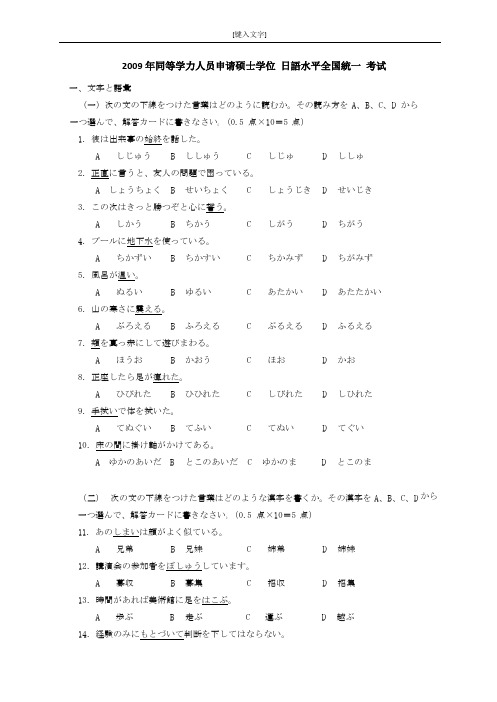
2009年同等学力人员申请硕士学位日語水平全国統一考试一、文字と語彙(一)次の文の下線をつけた言葉はどのように読むか。
その読み方をA、B、C、D から一つ選んで、解答カードに書きなさい。
(0.5点×10=5 点)1.彼は出来事の始終を話した。
A しじゅうB ししゅうC しじゅD ししゅ2.正直に言うと、友人の問題で困っている。
A しょうちょくB せいちょくC しょうじきD せいじき3.この次はきっと勝つぞと心に誓う。
A しかうB ちかうC しがうD ちがう4.プールに地下水を使っている。
A ちかずいB ちかすいC ちかみずD ちがみず5.風呂が温い。
A ぬるいB ゆるいC あたかいD あたたかい6.山の寒さに震える。
A ぶろえるB ふろえるC ぶるえるD ふるえる7.頬を真っ赤にして遊びまわる。
A ほうおB かおうC ほおD かお8.正座したら足が痺れた。
A ひびれたB ひひれたC しびれたD しひれた9.手拭いで体を拭いた。
A てぬぐいB てふいC てぬいD てぐい10.床の間に掛け軸がかけてある。
A ゆかのあいだB とこのあいだC ゆかのまD とこのま(二)次の文の下線をつけた言葉はどのような漢字を書くか。
その漢字をA、B、C、Dから一つ選んで、解答カードに書きなさい。
(0.5点×10=5 点)11.あのしまいは顔がよく似ている。
A 兄弟B 兄妹C 姉弟D 姉妹12.講演会の参加者をぼしゅうしています。
A 募収B 募集C 招収D 招集13.時間があれば美術館に足をはこぶ。
A 歩ぶB 走ぶC 運ぶD 越ぶ14.経験のみにもとづいて判断を下してはならない。
A 根づいてB 拠づいてC 元づいてD 基づいて15.大学に吅格したことがわかり、彼はむねをなでおろした。
A 胸B 腹C 腰D 脳16.まず、箱の底に紙をしいておく。
A 置いてB 放いてC 設いてD 敷いて7.危険物をはんばいするガソリンスタンドには、資格を持った人がいなければならない。
